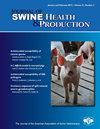猪繁殖与呼吸综合征病毒感染期间营养补充对猪生产性能和疾病行为的影响
IF 0.7
4区 农林科学
Q3 Agricultural and Biological Sciences
引用次数: 1
摘要
目的:探讨营养添加剂对猪繁殖与呼吸综合征病毒(PRRSV)感染猪的生产性能和发病行为的影响。材料和方法:在10周龄时,108头PRRSV naïve母猪(平均[SD]体重:31 [1.4]kg)被分配到一个商业畜棚的18个栏中,并参加了为期35天的PRRSV挑战研究。经过5天的驯化期后,所有猪鼻内和肌肉内接种一种PRRSV野毒株,并开始营养补充处理。治疗包括不补充营养(对照组;N = 6支笔)、水营养补充(水;N = 6只),以及水和饲料营养补充(水+饲料;N = 6支笔)。在接种后0、7、14、21、28和35天每周记录笔的性能。在-1、3、6、9、12、15和18 dpi时记录猪的家圈行为。结果:在35天的攻毒过程中,猪的病毒血症和生产性能均未出现显著差异。与对照组相比,水+饲料添加剂提高了猪的坐位;然而,没有观察到其他疾病行为治疗的差异。活性下降6和9 dpi。饮食减少了6个百分点,而饮酒则从6个百分点减少到18个百分点在余下的行为观察期。结论:在水和水+饲料中添加营养添加剂对prrsv感染猪的疾病行为影响很小,对病毒血症或生产性能没有观察到的影响。减少活动、饮食和饮水可以帮助饲养员识别有健康问题的猪。本文章由计算机程序翻译,如有差异,请以英文原文为准。
Nutrient supplementation effects on pig performance and sickness behavior during a porcine reproductive and respiratory syndrome virus infection
Objective: Investigate how nutrient additive inclusion impacts performance and sickness behavior in pigs infected with porcine reproductive and respiratory syndrome virus (PRRSV). Materials and methods: At 10 weeks of age, 108 PRRSV naïve barrows (mean [SD] body weight: 31 [1.4] kg) were allotted into 18 pens in a commercial barn and enrolled in a 35-day PRRSV challenge study. After a 5-day acclimation period, all pigs were inoculated intranasally and intramuscularly with a field strain of PRRSV and began nutrient supplement treatments. Treatments included no nutrient supplement (control; n = 6 pens), water nutrient supplement (water; n = 6 pens), and water and feed nutrient supplement (water+feed; n = 6 pens). Pen performance was recorded weekly at 0, 7, 14, 21, 28, and 35 days post inoculation (dpi). Pig home-pen behavior was recorded on -1, 3, 6, 9, 12, 15, and 18 dpi. Results: Over the 35-day challenge, no significant differences in pig viremia or performance were reported due to treatment. Compared to control, water+feed additive increased sitting in pigs; however, no other sickness behavior treatment differences were observed. Decreased activity was observed 6 and 9 dpi. Eating was decreased 6 dpi whereas drinking was decreased from 6 dpi throughout the rest of the behavioral observation period at 18 dpi. Implications: The addition of a nutrient additive in water and water+feed had minimal effect on sickness behavior and no observed effect on viremia or performance of PRRSV-infected pigs. Decreased activity, eating, and drinking may help caretakers identify health-challenged pigs.
求助全文
通过发布文献求助,成功后即可免费获取论文全文。
去求助
来源期刊
CiteScore
1.80
自引率
0.00%
发文量
29
审稿时长
>36 weeks
期刊介绍:
The Journal of Swine Health & Production (JSHAP) is an open-access and peer-reviewed journal published by the American Association of Swine Veterinarians (AASV) since 1993. The aim of the journal is the timely publication of peer-reviewed papers with a scope that encompasses the many domains of applied swine health and production, including the diagnosis, treatment, management, prevention and eradication of swine diseases, welfare & behavior, nutrition, public health, epidemiology, food safety, biosecurity, pharmaceuticals, antimicrobial use and resistance, reproduction, growth, systems flow, economics, and facility design. The journal provides a platform for researchers, veterinary practitioners, academics, and students to share their work with an international audience. The journal publishes information that contains an applied and practical focus and presents scientific information that is accessible to the busy veterinary practitioner as well as to the research and academic community. Hence, manuscripts with an applied focus are considered for publication, and the journal publishes original research, brief communications, case reports/series, literature reviews, commentaries, diagnostic notes, production tools, and practice tips. All manuscripts submitted to the Journal of Swine Health & Production are peer-reviewed.

 求助内容:
求助内容: 应助结果提醒方式:
应助结果提醒方式:


